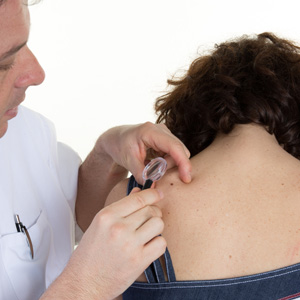The topic of moles is important in today’s society. More and more people are being diagnosed with skin cancer and, although not every type is as serious as melanoma, there are inherent risks to both squamous cell and basal cell carcinomas. In addition to discussing ways to protect your skin, it is also beneficial to ask questions about the potential need for mole removal. Dr. Roger Koreen, an experienced dermatologist in Huntington, NY, consults with patients about moles nearly every day.

Even when you have heard or read about the signs of skin cancer, it can be difficult to identify whether a single spot on your body is abnormal. Many people visit the Dermatology and Cosmetic Laser Center asking about red moles, considering them suspicious.
Does a red mole indicate skin cancer?
Typically, a red mole is a harmless growth. A round spot that is red or purple may be a cherry hemangioma. Essentially, this growth is an accumulation of blood vessels. Cherry hemangiomas do not need to be removed for health purposes, though many people do choose removal for cosmetic reasons. Additionally, the hemangioma that becomes raised may be more easily injured or scraped, causing discomfort or bleeding.
A true mole, as well, may be red and raised. Called intradermal melanocytic nevi, this type of mole is more common on fair-skinned, light-haired people with light eyes. The true mole may be pink and usually remains consistent in color, shape, and size. Like the cherry hemangioma, the intradermal melanocytic nevus is raised and may be bumped or scraped.
Pyogenic granulomas are red growths that may develop quickly. Due to their tendency to bleed and their rapid growth, these lesions may be removed.
Moles come in so many colors, shapes, and sizes that abnormal growth may occur without your knowledge. Dr. Roger Koreen performs skin cancer screenings, the annual assessment of skin using specialized instruments and lighting. In addition to performing in-depth screening, Dr. Koreen teaches patients how to perform self-examination at home. Combined monthly self-exams and yearly dermatologic screenings can significantly decrease the risk of skin cancer developing and advancing.
Schedule your skin cancer screening at the Dermatology and Cosmetic Laser Center. Call (631) 417-3300 today.









